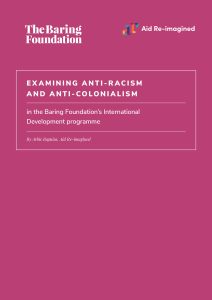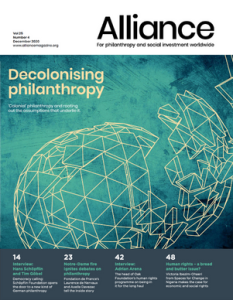Where are we now?
The issue of racism within the aid sector is rightly in the news again, as the International Development Committee concluded in June that ‘the very structure of international aid still reflects the power relationships of colonialism, with the main decision-making remaining in richer nations’. It calls on organisations ‘to shift decision-making power and resources to the communities they work with’.
 In 2021, as part of our mid-term strategy review, we commissioned Arbie Baguios to examine anti-colonialism and anti-racism in our International Development programme. He was supported by contributions from our grantholders and we are grateful to them for the time and support offered as we reflected on these issues.
In 2021, as part of our mid-term strategy review, we commissioned Arbie Baguios to examine anti-colonialism and anti-racism in our International Development programme. He was supported by contributions from our grantholders and we are grateful to them for the time and support offered as we reflected on these issues.
Since 2015, the programme has aimed to empower LGBTI communities in sub-Saharan Africa, focused on lesbian, bisexual and queer women and trans communities. We know that our colonial legacy impacts this work and Arbie points out that colonialism resulted in much of the criminalisation of LGBTI people in Africa (and beyond) and has imposed western notions of LGBTI identity. Our grantholders also reminded us that racism plays a powerful role in the way oppression is experienced by diverse members of the LGBTI community.
So, has our approach as a funder been effective in challenging this inherent colonialism and racism?
At its core, the programme aims to increase resources for locally based LGBTI civil society and to develop partner grantmakers based in their regions and led by their communities. The vast majority of our resources have been awarded to local organisations under the programme.
As we move into the next phase of our strategy, the review encouraged us to retain our focus on black and LBQTI-led partners. As a core value of the Foundation, we were also pleased to hear that our deep, trusting and supportive relationships are valued by partners. As was the ease, responsiveness and flexibility of our funding.
We are proud of this work, but know that our efforts to be anti-colonial and anti-racist mean we must also acknowledge that our history and that of Baring Brothers – the bank that created the Foundation in 1969 – are intertwined with colonial Britain. This includes that during parts of the Bank’s history it had involvement in slavery and in the process of colonisation. You can find out more about this history through a separate charity, The Baring Archive. It is also referenced on our website.
The review also encouraged us to provide more transparency on our current investments. In January this year, we adopted a new and more detailed statement on our approach to responsible investment.
Like the aid sector more broadly, this is the beginning – not the end – of a journey to develop anti-colonial and anti-racist practices in our work.
For the International Development programme, this includes a need to think hard about what sustainability of funding means for our partners. We are already discussing the duration of our grants as part of this. We also remain committed to advocating for the work of our partners and their models of locally-led, participatory grantmaking. We continue to work alongside other grantmakers and engage with policymakers, including the UK Government.
We are sharing Arbie’s work as part of that commitment and hope that it can act as a resource for the broader field.
Arbie’s report also highlighted the importance of meaningful representation of Global South LBQTI+ stakeholders in decision-making. We are keen to see diversity of thought and experience on our Board, alongside appropriate expertise. We have focused on candidates based in Africa, with expertise and lived and/or learned experience of LBQTI+ communities in recent recruitment.
This article was originally published by the Baring Foundation on 22 August 2022. It is being reshared in Alliance with permission.
Emebet Wuhib-Mutungi is a Baring Foundation trustee and a Senior Health Adviser at BBC Media Action.
Upcoming issue: Decolonising philanthropy
 The word ‘decolonisation’ was coined to describe the withdrawal of colonial powers from territories they had occupied. What forms have decolonisation practices taken among foundations? Should philanthropy be making reparations? And what significance does decolonisation have for philanthropic institutions when they are geographically distant from the former colonies? These are among the questions to be explored in the next issue of Alliance. Guest edited by Shonali Banerjee, Centre for Strategic Philanthropy, Cambridge University and Urvi Shriram, Indian School of Development Management.
The word ‘decolonisation’ was coined to describe the withdrawal of colonial powers from territories they had occupied. What forms have decolonisation practices taken among foundations? Should philanthropy be making reparations? And what significance does decolonisation have for philanthropic institutions when they are geographically distant from the former colonies? These are among the questions to be explored in the next issue of Alliance. Guest edited by Shonali Banerjee, Centre for Strategic Philanthropy, Cambridge University and Urvi Shriram, Indian School of Development Management.
Subscribe today to make sure not to miss it!



Comments (0)